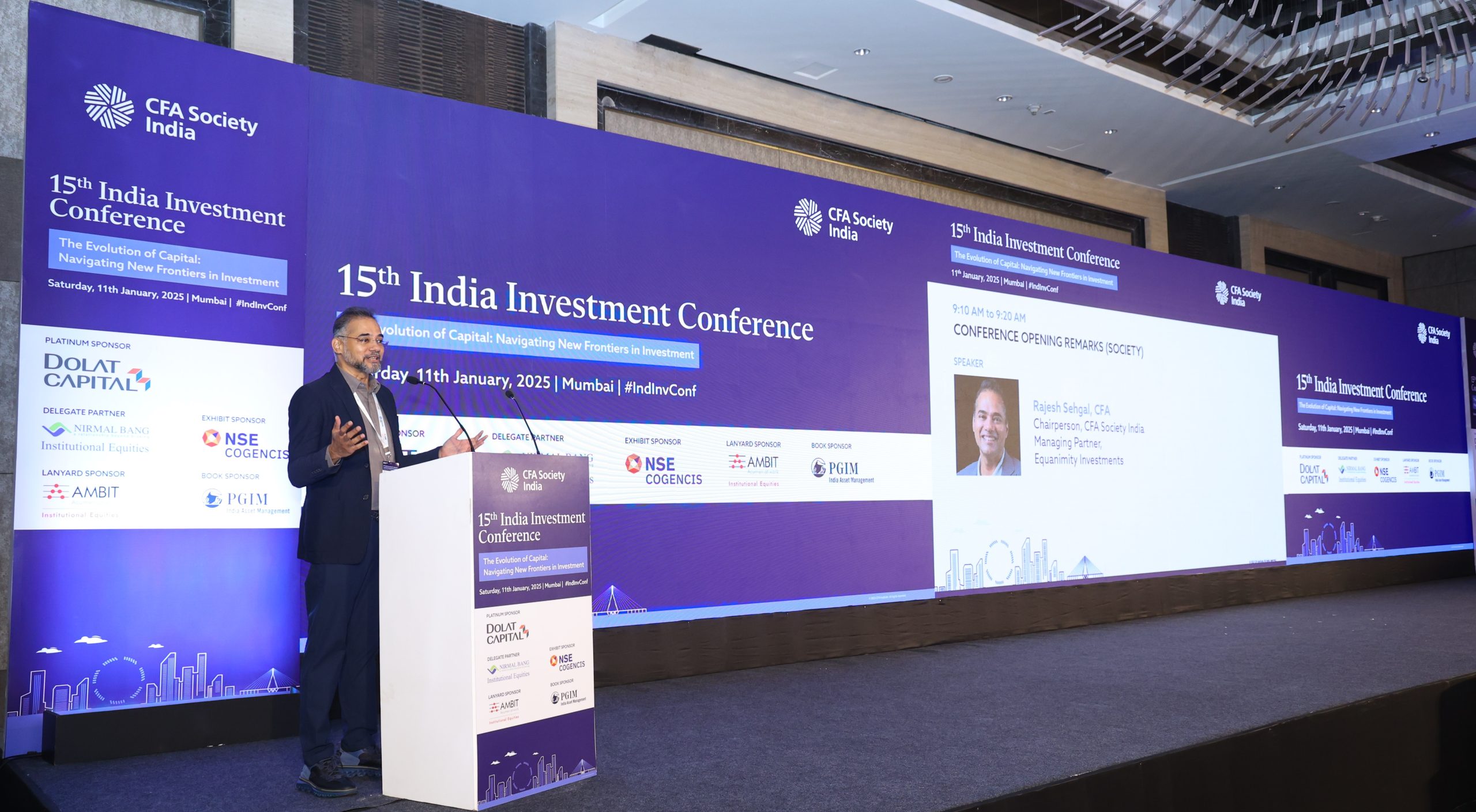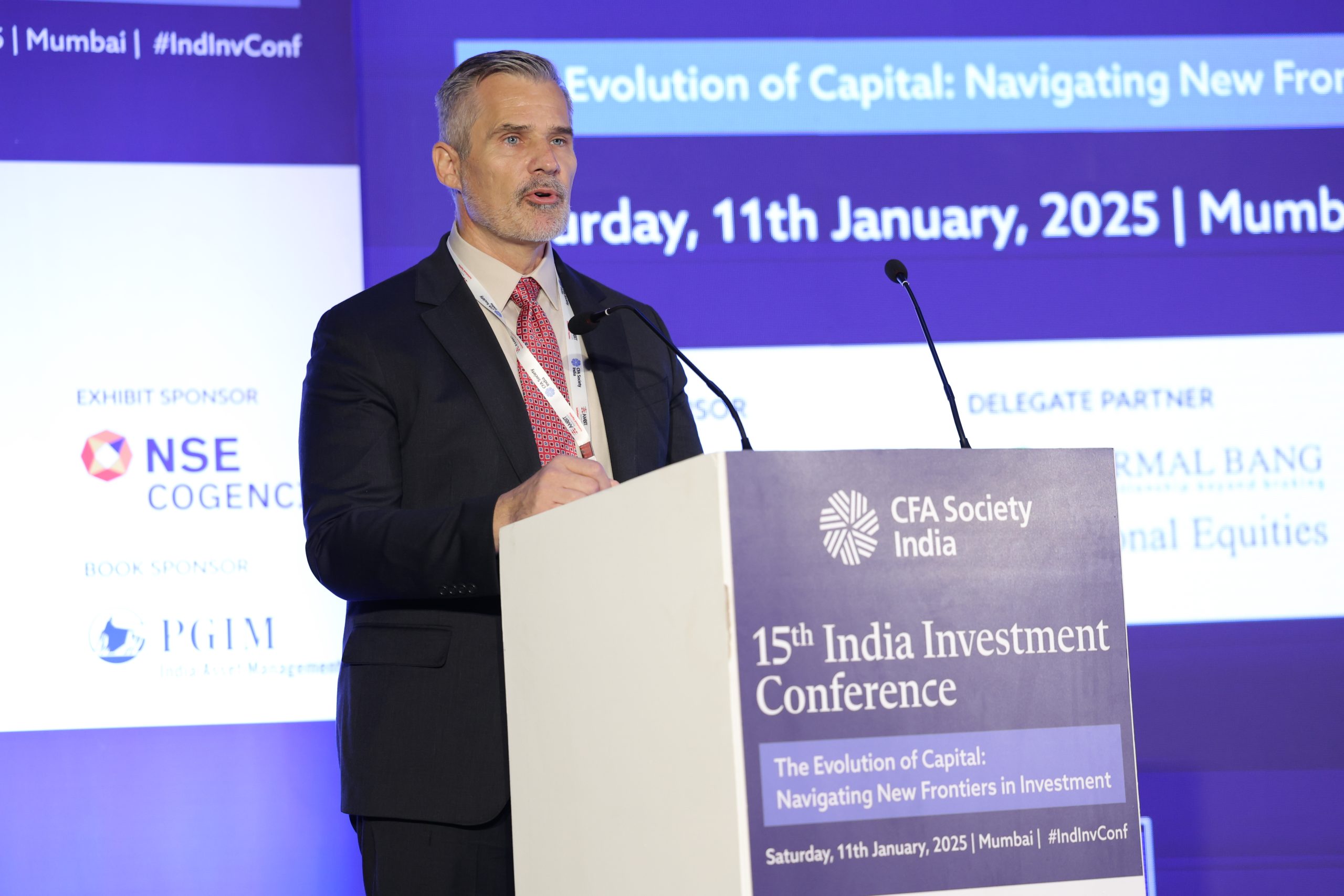- January 14, 2025
- Posted by: CFA Society India
- Category:BLOG, Events, PR

Investment professionals gathered in Mumbai to delve into economic resilience amid disruptions, investment avenues and techniques, and perspectives on sustained alpha generation.
Mumbai, 13 January 2025: CFA Society India hosted the 15th edition of its flagship conference, India Investment Conference, in Mumbai on 11 January 2025. Over 400 financial markets professionals including CFA charterholders, investment professionals, and wealth managers participated in the conference. Co-hosted by the CFA Institute, the annual conference attracts leading asset managers, thought leaders, esteemed academicians, and prominent finance professionals who offer insights to explore emerging trends shaping the future of investing and discuss strategies for generating sustainable investment alpha.
The conference explored a wide range of topics such as shaping the future of investing, navigating economic anomalies, managing geopolitical uncertainty, opportunities in quantitative strategies, changing dynamics of emerging markets, management of multi-generational portfolios, the landscape of private market investments in India, and perspectives on boutique strategies for generating alpha.
The conference was chaired by Kunal Sabnis, CFA (Portfolio Manager, Nine Rivers Capital) and Aanchal Almal, CFA (Associate Vice President – Products, TrustPlutus Wealth), who reiterated CFA Society India’s commitment in upholding the highest ethical and professional standards within the Indian investment industry.
The opening remarks was delivered by Rajesh Sehgal, CFA (Chairperson, CFA Society India and Managing Partner, Equanimity Investments) wherein he looked back at CFA Society India’s journey of 20 years being built on shared values, and a common purpose. He highlighted the Society’s key milestones of being a strong community of 2,600 members and the successful conclusion of around 65 events in FY 2025, while acknowledging the persistent efforts of the volunteers in the activities of the Society.

Chris Wiese, CFA (Managing Director, Education, CFA Institute) recognised the role of CFA Society India in building a vibrant and inclusive community of finance professionals over its two-decade long journey. He discussed the importance of education as a profound enabler serving as a cornerstone for professional and personal evolution. He also spoke about the role of CFA Program in providing a level-playing field in the world of finance, which is changing at an unprecedented pace, driven by technology, sustainability, and the need for diversity and inclusion.
Shamit Chokshi, CFA (Director, CFA Society India and Global Asset Management expert) remarked, “Our forums are a platform for continued learning for professional money managers, attracting industry professionals to debate, network and exchange ideas for a thriving asset and wealth management ecosystem and nurturing talent for the investment business.”
Shamit, who chairs the Professional Learning Committee at the Society, moderated the opening session, ‘Charting a Course: Navigating Resilience and Opportunities amidst Economic Anomalies’, led by Alessia Berardi (Head of Emerging Macro Strategy, Amundi Investment Institute). While Alessia presented her macroeconomic outlook, they deliberated on the bright spots in the global economy, asset allocation approach and potential risks as we head into an uncertain 2025. They touched upon various topics including the growth premium for emerging markets, the heterogenous recovery in Europe, US growth exceptionalism, the sustainability of sovereign debt, and the likely impact of Trump 2.0 policies and other factors on Emerging Markets and economic growth.
The second session had Rahul Chadha (Founder and Chief Investment Officer, Shikhara Investment Management, New York) present his views on ‘Investing in a World of Heightened Geopolitics Uncertainty and Tech Disruption’. Rahul spoke about the need for strategic adaptation for nations in an uncertain world. He discussed the shifting of global power dynamics as we witness the becoming of a multi-polar world and how areas such as artificial intelligence, semiconductors, and quantum computing will likely dominate the world economy. He compared the AI-led productivity boom with that of the 1980s, drawing some similarities. He also discussed the role of AI-led disruption in accelerating change and how Asia stands at the epicenter of innovation.
Olivia Engel, CFA (Senior MD, Head of Investment Strategy and Operations, State Street Global Advisors) led the next session on ‘Rethinking Quant: Intuitive Signals and Unexpected Opportunities’ wherein she set the tone for the discussion by describing quantitative investing as involving active management and subjectivity. She outlined how shorter-term strategies aim at exploiting micro-temporary anomalies while longer-holding period strategies focus more on the fundamental aberrations. She elaborated on certain signals while underscoring the importance of developing sector-specific signals and using proxy signals for evaluating companies instead of using simple metrics. Throughout the session, she addressed multiple myths about quant investing. Olivia also spoke about how avoiding tail-risk events can lead to superior returns over time.
The next session titled ‘Emerging Markets: Changing Dynamics and How to Construct a Portfolio Today’ was conducted virtually by Dr. Mark Mobius (Chairman, Mobius Emerging Opportunities Fund). “There is nothing artificial or intelligent about AI. It’s actually accelerated information,” said Dr. Mark as he discussed the rise of rapid communication systems that have a faster pace as well as a wider scope. He touched upon the rise of China as an economic power and the reasons for India growing faster than major economies. He also spoke about the changing definition of emerging markets in a macro environment where per capita incomes of certain emerging markets are considerably higher and how companies in emerging markets are going global. In the Q&A session that followed, Dr. Mark shared his views on a variety of areas including the US dollar, gold, commodities, ESG, renewable energy, and the current world economy. Two prominent thoughts from his session were ‘Health is Wealth’ and ‘Emotion is Potion.’
Lakshminarayana R. Kollengode (Chief Endowment Officer, Azim Premji Foundation) led the next session on ‘An Endowment’s Perspective: Managing a Multi-Generational Portfolio’ wherein, he gave an overview of Azim Premji Foundation’s overall investment allocation. He explained the nature of multi-generational portfolios as being those that have extremely long-term horizons, working with a perpetual outlook, and typically working on a 100-year plan. He discussed the importance of endowment liquidity and the quantum of investment returns in supporting various planned as well as non-planned initiatives of the foundation. He shared how the Global Financial Crisis of 2008 brought out the importance of knowing the requirements of beneficiaries well when managing the investment portfolio of the endowment. He also touched upon the criticality of liability modelling and tweaking the portfolio to account for inflation.
The next session on ‘Private Market Investing in India’ by Srini Sriniwasan (Managing Director, Kotak Alternate Asset Managers Ltd.) saw him discussing some nuances of the private market, the most prominent being the levy to invest in markets when there are no market opportunities available. He highlighted the importance of the ability to say no to deals whenever warranted and the patience required to build relationships with large investors. He touched upon the tips for evaluating private market managers and for new managers setting out to raise capital. The Q&A session also featured an outlook on the real estate and IPO markets in India.
The last session was titled ‘The Boutique Manager’s Advantage in Generating Alpha’ was a panel discussion featuring Vaibhav Sanghavi (Chief Executive Officer, ASK Hedge Solutions), Sandeep Daga (MD & CIO, Nine Rivers Capital), Manish Bhandari (Founder, CEO and Portfolio Manager, Vallum Capital Advisors) and Rajesh Kothari (Founder and CIO, AlfAccurate Advisors). The panelists shared key insights about their respective investment approaches that have enabled them to generate alpha in a sustained manner over long periods of their investment journey. The engaging discussions involved perspectives on what defines a boutique style of investment management and the role of skill, strategy, size, flexibility, and leverage in consistent alpha generation.
ABOUT CFA SOCIETY INDIA*
The Indian Association of Investment Professionals (IAIP), the India Society of CFA Institute, was established in April 2005 as an association of local investment professionals consisting of portfolio managers, security analysts, investment advisors and other financial professionals. As one of the over 160 CFA Institute member societies, the IAIP connects local CFA Institute members to a global network of investment professionals. For the continuing up-gradation of knowledge and skills of members, IAIP conducts speaker events and workshops led by leading finance professionals. *CFA Society India is a registered trademark of CFA Institute licensed to be used by the Indian Association of Investment Professionals.
ABOUT CFA INSTITUTE
As the global association of investment professionals, CFA Institute sets the standard for professional excellence and credentials. We champion ethical behavior in investment markets and serve as the leading source of learning and research for the investment industry. We believe in fostering an environment where investors’ interests come first, markets function at their best, and economies grow. Spanning nearly 200,000 charterholders worldwide across 160 markets, CFA Institute has 10 offices and 160 local societies. Find us at www.cfainstitute.org or follow us on LinkedIn and X at @CFAInstitute.
